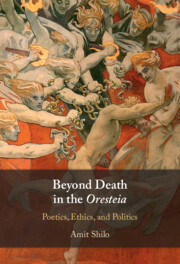Refine search
Actions for selected content:
6 results
Chapter 2 - Visual Representations of the Gods in Tragedy
- from Part I - Greek Tragedy and Mechanical Epiphany
-
- Book:
- Technologies of the Marvellous in Ancient Greek Religion
- Published online:
- 04 September 2025
- Print publication:
- 24 July 2025, pp 49-63
-
- Chapter
-
- You have access
- Open access
- HTML
- Export citation

Amazons
- The History Behind the Legend
-
- Published online:
- 26 March 2025
- Print publication:
- 24 April 2025
Chapter 5 - Heroes in the Oresteia
-
- Book:
- Beyond Death in the <i>Oresteia</i>
- Published online:
- 01 September 2022
- Print publication:
- 08 September 2022, pp 114-144
-
- Chapter
-
- You have access
- Open access
- HTML
- Export citation
Chapter 6 - The Ghost of Clytemnestra
-
- Book:
- Beyond Death in the <i>Oresteia</i>
- Published online:
- 01 September 2022
- Print publication:
- 08 September 2022, pp 145-175
-
- Chapter
-
- You have access
- Open access
- HTML
- Export citation

Beyond Death in the Oresteia
- Poetics, Ethics, and Politics
-
- Published online:
- 01 September 2022
- Print publication:
- 08 September 2022
-
- Book
-
- You have access
- Open access
- Export citation
AESCHYLUS, EUMENIDES 522–5
-
- Journal:
- The Classical Quarterly / Volume 72 / Issue 1 / May 2022
- Published online by Cambridge University Press:
- 09 March 2022, pp. 424-428
- Print publication:
- May 2022
-
- Article
-
- You have access
- Open access
- HTML
- Export citation
